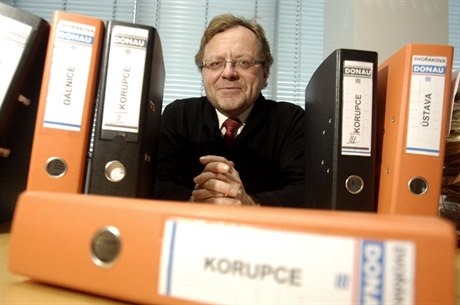By law, the Supreme Audit Office (NKÚ) oversees the management of state property and observance of the state budget. The office’s spheres of authority have been partially modified as a result of the new anti-corruption strategy submitted by Interior Minister Radek John (Public Affairs, VV).
NKÚ vice president Miloslav Kala told Czech Postion, however, that this proposal will not result in tackling the corruption problem in the Czech Republic, whose politicians and authorities have systematically failed to address serious allegations in the past — most recently in a case that led to the resignation of the Ministry of Enviroment, Pavel Drobil (Civic Democrats, ODS).
Q: At the present time, the Drobil affair and the suspicion of dubious conduct at the State Environmental Fund (SFŽP) is a hot topic. Does it reflect the government’s ineffectiveness in the fight against corruption?
A: Yes, absolutely. Let’s compare the behavior of former Minister of the Environment Drobil (Civic Democrats, ODS), Prime Minister [Petr] Nečas (ODS) and Minister of the Interior John with what is in the submitted government anti-corruption strategy concerning the protection of whistle-blowers. The document proposes creating conditions that would make it possible for them to report corrupt or otherwise dubious conduct.
The basic principle of their protection is supposed to be the guarantee that their identity would not be disclosed and their anonymity wouldn’t be threatened. And how did the three mentioned gentlemen treat the whistle-blower, former State Environmental Fund (SFŽP)Director Michálek? His superior, Minister Drobil, fired him, Prime Minister Nečas did not want to talk to him, and the Minister of the Interior told him to take the story to a journalist.
Q: The government brands itself as anti-corruption. In your opinion, will the proposed government strategy be able to significantly reduce corruption?
‘Everything [regarding corruption] was analyzed long ago; it doesn’t have to be done again.’
A: Corruption, defined in criminal law, is impossible to prove. This draws upon [former World Bank chief economist Joseph] Stiglitz’s theory of information asymmetry, for which he was awarded a Nobel Prize. The Czech government says it will analyze the problem of corruption. Yet everything was analyzed long ago, it doesn’t have to be done again. They should read the World Bank’s website.
I don’t quite understand why the strategy is being proposed at the end of 2010 and its time delimitation is for 2010 to 2012. Why the strategy should also be approved for this year, which will finish in 10 days? How thoroughly has the document been prepared? That which they propose will not lead to tackling a problem that threatens the civilized foundations of our society. Try to apply the new strategy to the current scandal connected with the former minister of the environment, Drobil. The result is pathetic.
Q: In the proposed strategy, what specifically do you object to?
A: Some of the timing appears somewhat curious. A number of the measures should begin to take effect by Dec. 31, 2010. By that date, for example, the government is expected to have received an analysis of the audits and supervision carried out in local and regional governments, a draft resolution stipulating the obligation for state authority bodies to draw up and publish their own ethics code, and sales of the public property should begin being made public.
The proposed strategy also counts on the fact that on Jan. 1, 2011, the amendment to the tax law would come into force. It is obvious that these tasks will not be fulfilled. And the question is whether the current government will be at all able and willing to implement all the measures in practice in the next few months or years.
Q: Is there any change that, on the other hand, could be implemented relatively quickly?
A: There are such measures; they have been prepared in the past several times. They concern, for instance, an amendment to the Constitution that would extend the powers of the NKÚ, which would thus be able to check how local and regional governments and other public entities handle property. Yet the strategy proposed by the government counts on the government proposal of this amendment to the Constitution only being submitted at the end of 2011.
Q: Should the powers of the NKÚ be strengthened in connection with the fight against corruption?
A: I would like the office to have jurisdiction for the regions, municipalities and public finance. Otherwise, I don’t think that our powers need to be extended.
Q: How, in your opinion, could corruption be effectively battled?
A: Every civil servant should, under the threat of punitive sanction, be obliged to make decisions relating to the outlaying of public money conscientiously and with professional care. This obligation is stipulated for the insolvency administrator. Moreover, officials should act with the due care of a proper manager, just as partners, statutory bodies and members of business companies’ bodies are obliged to do.
Q: Would this legal regulation function in the case of public administration too?
A: Why couldn’t every civil servant be liable for damage to the same extent as the insolvency administrator is? In this case the right to compensation for damage or other detriment lapses within three years. If, however, it concerns damage caused by a premeditated criminal act for which an official was lawfully sentenced, the term of prescription is then prolonged to up to 10 years from the completion of the insolvency proceedings. ‘[If] such a measure were really to be implemented, the entire state would grind to a halt. But it’s better than allowing the state to be stolen.’
I can be accused of the fact that if such a measure were really to be implemented, the entire state would grind to a halt. But it’s better than allowing the state to be stolen. And we should bear in mind that the scale of theft has been growing beyond all limits. We pay Kč 30 million for selecting a bank where we are going to deposit Kč 5 billion crowns. And because it works well, we repudiate the contract and find a new “adviser” for Kč 80 million.
Q: Could you give a specific example of how it would work in practice if public servants were criminally liable?
A: Take a waste water purification plant. The NKÚ is to ascertain the project’s efficiency, i.e. the adequate price. Let’s say it is Kč 10 billion. If an official signs an operation for Kč 12 billion, he has a problem with the Penal Code and he has the obligation to prove he behaved with the due care of a proper manager. The whole problem would thus shift from the “Michálek and Drobil” level to the people who really sign the invoices and enter them in the bookkeeping.
Today, threatened with the loss of their job, civil servants are forced not to behave like proper managers. On the contrary, they even receive bonuses; their decisions are covered up by collective bodies or the opinions of “experts.” When they fail to comply with the instructions they are given, they are fired. If civil servants were criminally liable, they would not carry out such instructions.
Q: But, couldn’t such a measure result in the situation that eventually no one would want to work in public administration because officials would bear immense liability?
A: Well, it is possible, but the measure is necessary. We will have to give public servants better salaries, but we will then know that they are not stealing. I am really outraged that someone wants to grab Kč 3 billion from our taxes. It is clear that we are fighting against a mafia that is extremely powerful, but shunning this fight means abandoning the civilized world.





